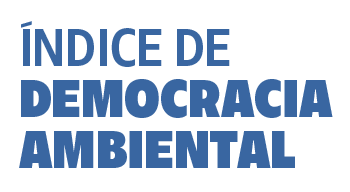In regions like the Amazon, where people and communities face constant threats, thinking about environmental democracy is more than relevant - it's urgent. But what does this mean in practice?
Environmental democracy is the integration of democratic principles and practices into environmental governance. In other words, it's about ensuring that all people - especially those most affected by environmental projects and policies - have access to information, can participate in decisions, act in a safe environment and have the backing of justice when their rights are violated.
The Environmental Democracy Index (IDA), created by Transparency International - Brazil and the Instituto Centro de Vida (ICV), translates this concept into concrete data, assessing four dimensions considered essential: access to environmental information, access to participation, access to environmental justice and protection of environmental defenders. These principles are also present in the Escazú Agreement, an international treaty that Brazil signed in 2018, but whose ratification is stalled in the National Congress.
Does Brazil have a strong environmental democracy?
According to the IDA data, the answer is: no. The overall average among the states of the Legal Amazon was just 34.5 points (on a scale of 0 to 100). No state or federal government received an "excellent" score for environmental democracy.
The IDA reveals a deep and systemic fragility in the Legal Amazon. The gaps identified help explain why Brazil is the second most violent country in the world for environmental and land defenders, according to data from Global Witness. In addition, the gaps identified have other impacts, such as less capacity to detect and confront environmental and related crimes, such as fraud and corruption, less effective public policies to protect the forest and an environment with little legal and reputational security for new businesses, investments and trade agreements.
How to strengthen environmental democracy
Strengthening environmental democracy requires more than well-worded laws. They need to be converted into real, accessible and effective practices. As the IDA data shows, this involves upgrading participatory spaces. Environmental councils need to include indigenous, quilombola, riverside and peripheral voices, with real conditions for participation.
It is also essential to reinforce the presence of public institutions in the territories, with defense offices, prosecutors' offices and specialized courts working where conflicts occur. The decentralization of services and the continuous training of civil servants and magistrates are fundamental, especially in the Amazon. The states with the best performance are those that, even initially, have created structures to deal with these demands.
Another critical point is the protection of environmental defenders. Most states in the Legal Amazon still don't have specific programs for this purpose - and when these services do exist, they are fragile. The lack of protocols, centers and reporting channels weakens the state's response to violence. Guaranteeing security for those who protect territories and ecosystems must be a priority.
Escazú Agreement
Environmental democracy is not a distant theory - it is the concrete basis for protecting lives, territories, the forest and the country's climate future. IDA's data reveals where Brazil is failing - and this is the first step towards action.
Their results highlight how the ratification of the Escazú Agreement by the National Congress could represent a real change of course - not because it solves everything immediately, but because it pushes the country forward in implementing an environmental policy centered on human rights, justice and equity.




